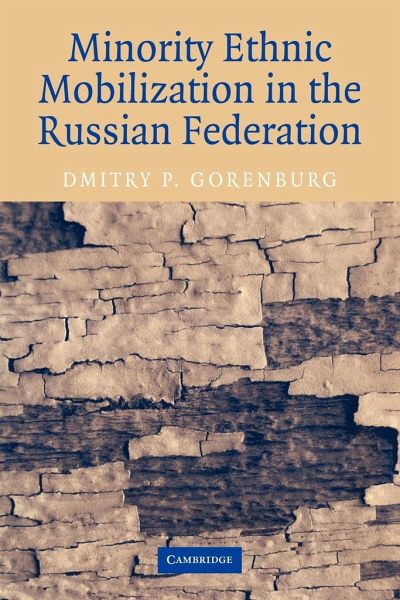
Minority Ethnic Mobilization in the Russian Federation
Versandkostenfrei!
Versandfertig in 1-2 Wochen
43,99 €
inkl. MwSt.
Weitere Ausgaben:

PAYBACK Punkte
22 °P sammeln!
Discusses the spread of nationalism in the Soviet Union and the Russian Federation.This book explains how state institutions affect ethnic mobilization. It focuses on how ethno-nationalist movements emerge on the political arena, develop organizational structures, frame demands, and attract followers. It does so in the context of examining the widespread surge of nationalist sentiment that occurred through the Soviet Union and Eastern Europe in the late 1980s and early 1990s. It shows that even during this period of institutional upheaval, pre-existing ethnic institutions affected the tactics ...
Discusses the spread of nationalism in the Soviet Union and the Russian Federation.
This book explains how state institutions affect ethnic mobilization. It focuses on how ethno-nationalist movements emerge on the political arena, develop organizational structures, frame demands, and attract followers. It does so in the context of examining the widespread surge of nationalist sentiment that occurred through the Soviet Union and Eastern Europe in the late 1980s and early 1990s. It shows that even during this period of institutional upheaval, pre-existing ethnic institutions affected the tactics of the movement leaders. It challenges the widely held perception that governing elites can kindle latent ethnic grievances virtually at will to maintain power. It argues that nationalist leaders can't always mobilize widespread popular support and that their success in doing so depends on the extent to which ethnicity is institutionalized by state structures. It shifts the study of ethnic mobilization from the whys of its emergence to the hows of its development as a political force.
Review quote:
'Dmitry Gorenburg's book is a very useful and theoretically incisive addition to the literature on post-Soviet Russia. The study is sophisticated and well-researched - A great strength of this book is that it contributes to advancing the debate on three fronts: institutionalism, democratisation, ethnic mobilisation.' Studies in Ethnicity and Nationalism
'- a most timely and much needed contribution to the debate - a stunning success - he makes a very significant contribution to the literature - well structured - a product of extensive research - rich in tables and figures - Gorenburg's excellent study deserves to be widely read by all those interested in this highly topical issue. I recommend it enthusiastically to all specialists in Russian as well as nationalism studies.' Slavonic and East European Review
'- an interesting contribution to our understanding of ethnicity and politics.' Ethnic and Racial Studies
'- a paradigmatic, and, to a large extent, innovative study of the micro-processes of nationalist mobilization.' Ab Imperio
Table of contents:
List of figures and tables; Preface; 1. Minority ethnic mobilization in Russia: an introduction; 2. Explaining ethnic mobilization: the role of ethnic institutions; 3. From cultural society to popular front: the formation and development of nationalist organizations; 4. The Soviet institutional legacy and ethno-nationalist ideology; 5. Institutions matter: measuring support for nationalism; 6. Intragroup variation in support for nationalism: not all ethnics are the same; 7. Outcomes: did regional governments adopt the nationalist agenda?; 8. The larger picture: support for nationalism in Russia's other republics; 9. Institutions and nationalism; Appendix: construction of variables and indices; References; Index.
This book explains how state institutions affect ethnic mobilization. It focuses on how ethno-nationalist movements emerge on the political arena, develop organizational structures, frame demands, and attract followers. It does so in the context of examining the widespread surge of nationalist sentiment that occurred through the Soviet Union and Eastern Europe in the late 1980s and early 1990s. It shows that even during this period of institutional upheaval, pre-existing ethnic institutions affected the tactics of the movement leaders. It challenges the widely held perception that governing elites can kindle latent ethnic grievances virtually at will to maintain power. It argues that nationalist leaders can't always mobilize widespread popular support and that their success in doing so depends on the extent to which ethnicity is institutionalized by state structures. It shifts the study of ethnic mobilization from the whys of its emergence to the hows of its development as a political force.
Review quote:
'Dmitry Gorenburg's book is a very useful and theoretically incisive addition to the literature on post-Soviet Russia. The study is sophisticated and well-researched - A great strength of this book is that it contributes to advancing the debate on three fronts: institutionalism, democratisation, ethnic mobilisation.' Studies in Ethnicity and Nationalism
'- a most timely and much needed contribution to the debate - a stunning success - he makes a very significant contribution to the literature - well structured - a product of extensive research - rich in tables and figures - Gorenburg's excellent study deserves to be widely read by all those interested in this highly topical issue. I recommend it enthusiastically to all specialists in Russian as well as nationalism studies.' Slavonic and East European Review
'- an interesting contribution to our understanding of ethnicity and politics.' Ethnic and Racial Studies
'- a paradigmatic, and, to a large extent, innovative study of the micro-processes of nationalist mobilization.' Ab Imperio
Table of contents:
List of figures and tables; Preface; 1. Minority ethnic mobilization in Russia: an introduction; 2. Explaining ethnic mobilization: the role of ethnic institutions; 3. From cultural society to popular front: the formation and development of nationalist organizations; 4. The Soviet institutional legacy and ethno-nationalist ideology; 5. Institutions matter: measuring support for nationalism; 6. Intragroup variation in support for nationalism: not all ethnics are the same; 7. Outcomes: did regional governments adopt the nationalist agenda?; 8. The larger picture: support for nationalism in Russia's other republics; 9. Institutions and nationalism; Appendix: construction of variables and indices; References; Index.




